|
Understanding investment options:
Savings, a prelude to investing
by Dimantha Mathew
This article is a part of First Capital Holdings' Investor Education
series. The Investor Education Series aims at improving investment
education and financial literacy in Sri Lanka and enabling investors to
make informed decisions about investments and the financial market and
is not an endorsement of specific products.
It is a truth universally acknowledged that money does not grow on
trees. It is also, however, accepted that with prudent investment and a
modicum of financial planning, you can develop your finances.
Here are a few basic tenets of investing, for those already in the
know and those hoping to cautiously test the investment waters.
 Whatís the difference between saving and investing? How do I start?
The terms saving and investing are often used interchangeably. While
there are similarities, there are also fundamental differences. Saving
is a prelude to investing and refers to the practice of keeping aside
money on a regular basis, to be accessed later. Whatís the difference between saving and investing? How do I start?
The terms saving and investing are often used interchangeably. While
there are similarities, there are also fundamental differences. Saving
is a prelude to investing and refers to the practice of keeping aside
money on a regular basis, to be accessed later.
While interest is accrued on savings, investment is a step further,
where one attempts to grow oneís money and build wealth. Investment is a
more active process than saving and varying investment tools contain
varying elements of risk.
Understanding risk
Unlike savings accounts, it is important to note that investment
earnings are not always guaranteed. Types of risk related to investment
include financial market movements, interest-rate risk, inflation risk,
currency risk and political risk.
As these can affect investments positively and adversely,
diversification of investments is important. Well thought out
diversification can reduce the risk profile of your investment
portfolio. As the age-old maxim goes, donít put all your eggs in one
basket.
Properly managed diversification can significantly lower risk while
maximising returns.
Investment goals
Hence it is important to arm yourself with the correct information
and identify your short-term and long-term financial goals before
embarking on your financial journey.
Before mapping out your investment plan, you need to identify your
funding capacity i.e. understanding your ability to allocate excess
funds for investment either as a lump sum or on a monthly basis.
Second, identify the investment time horizon that you have earmarked
for your investments. Before investing it is important to know when you
will need your funds. Each investorís financial goals and time horizon
may differ.
For example you may need a monthly income after retirement and a lump
sum to finance your childrenís university education or buy a new car.
Evaluate the acceptable risk level and embark on building a
diversified investment portfolio in line with your risk appetite and
expected return. One needs to understand that the higher the risk, the
higher the return and similarly the lower the risk, the lower the
return.
Regardless of which investment instruments you choose and time
horizon you invest for, be sure to meticulously evaluate the instruments
and companies with whom you intend to place your hard earned money and
donít be afraid to ask questions.
Investment instruments
The choice of investment instrument will vary according to your
investment time horizon and individual risk appetite. In addition to
bank deposits, government securities, equity and debt listed on the
stock market, unlisted securities such as securitised papers and
commercial papers, unit trusts and private equity are some of the
options available for consideration.
The table outlines the element of risk and investment horizon for
different investment instruments.
Once you have considered your investment options and decided on your
investment time horizon, carefully examine your debt commitments. It is
strongly recommended that you seek professional advice before you
invest. While you may prefer to make your own investment decisions
through self-education, a qualified financial professional or investment
adviser might be better equipped to advise you on the investment
opportunities available to meet your goals and risk appetite.
Investment landscape
When vetting an investment adviser, be sure to understand the
services they offer, terms of compensation and track record. A perusal
of their affiliations, history and assets under management is also
recommended. Good communication, clear articulation of your financial
goals and mutual trust are essential when relying on the services of an
investment adviser.
A good investment adviser can guide you in matching financial tools
with your monetary goals and help you mitigate risk and regularly
monitor the performance of your investments. Investors can turn to
regulators such as the Central Bank, Securities and Exchange Commission
of Sri Lanka and the Colombo Stock Exchange for information or queries.
Dimantha Mathew, Manager, Research, First Capital Equities (Pvt) Ltd,
has over eight years of experience in the investment banking space in
Sri Lanka with extensive exposure in equity research, fund management,
corporate finance and advisory services. He holds an MBA from the
University of Wales and is an Associate Member of the Chartered
Institute of Management Accountants and Chartered Global Management
Accountants. He also holds a Bachelorsí of Law Degree from the
University of London and is an Attorney-at-Law in Sri Lanka. |

